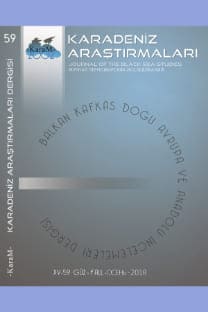ÇATIŞAN KÜRESEL GÜÇLER VE KARADENİZ GÜVENLİĞİ: ABHAZYA ÜZERİNE BİR DEĞERLENDİRME
___
ALLISON Roy (2008), “Russia Resurgent?: Moscow’s Campaign to ‘Coerce Georgia to Peace’”, International Affairs, 86 (6): 1145-1171. ----- (2009), “The Russian Case for Military Intervention in Georgia: International Law, Norms and Political Calculation”, European Security, 18 (2): 173-200.ALEXANDRA-ARBATOVA Nadia (2008), “Regional Cooperation in the Black Sea Area in the Context of EU-Russia Relations”, ICBSS Xenophon Paper 5, Athens: ICBSS.
BOWKER Mike (2011), “The War in Georgia and the Western Response”, Central Asian Survey, 30 (2): 197-211.
COOLEY Alexander - Lincoln A. Mitchell (2009). “No Way to Treat Our Friends: Recasting Recent U.S.-Georgian Relationship”, The Washington Quarterly, 32 (1): 27-41. ----- (2010), “Engagement without Recognition: A New Strategy toward Abkhazia and Eurasia’s Unrecognized States”, The Washington Quarterly, 33(4): 59-73.
ÇÖRTEN Burcu (2009), Güncel Karadeniz Jeopolitiği, Ankara: Ankara Üniversitesi Yayınları.
FAWN Rick – Sally Cummings (2001), “Interests over Norms in Western Policy towards the Caucasus: How Abkhazia is No One’s Kosovo”, European Security, 10(3): 84-108.
FAWN Rick (2002), “Russia’s Reluctant Retreat from the Caucasus: Abkhazia, Georgia and the US after 11 September 2001”, European Security, 11(4): 131-150.
GITSBA Inar (5 Şubat 2011), “Ağustos 2008 Savaşı’ndan Sonra AbhazyaRusya İlişkilerinin Dinamiği”, KARAM’da yapılan sunum, Ankara.
GLEBOV Sergei (2009), “Black Sea Security as a Regional Concern for the Black Sea States and the Global Powers”, Southeast European and Black Sea Studies, 9(3): 351-365.
PAVLIUK Oleksandr (1999), “The Black Sea Economic Cooperation: Will Hopes Become Reality?”, Andrew Cottey (ed.), Subregional Cooperation in the New Europe: Building Security, Prosperity and Solidarity from the Barents to the Black Sea, London: Macmillan Press, 128-150.
RECORD Jeffrey (2002), “Collapsed Countries, Casualty Dead, and the New American Way of War”, Parameters: US Army College Quarterly, XXXII(2): 4-23.
“Russia Ratifies Deals on Border Protection with S. Ossetia, Abkhazia”, 5 Nisan 2010, RIANOVOSTI, http://en.rian.ru/russia/20100405/15844 1079.html, (23.08.2013).
“Russia Justifies Deploying S-300 Missile Systems in Abkhazia (Update 1)”, 13 Ağustos 2010, RIANOVOSTI, http://en.rian.ru/military_news/20100 813/160190388.html, (23.08.2013). “(1997). The Situation in Abkhazia, Georgia: Report of the SecretaryGeneral”, International Peacekeeping, 3(3): 123-131.
TSANTOULIS Yannis (2009), “Geopolitics, (Sub)regionalism, Discourse and a Troubled ‘Power Triangle’ in the Black Sea”, Southeast European and Black Sea Studies, 9(3): 243-258.
VORONOV, Y. N. - P. V. Florenski - T. A. Shutova (ed.) (2002), Abhazya’nın Beyaz Kitabı: 1992-1993, (tr. Billur Behman, Kayhan Yükseler), Ankara: Kafkas Derneği.
YEMELYAYENKO Vladimir (5 July 1992), “Abkhazia: Next in Line after South Ossetia?”, Moskovskiye Novosti, Ana K. Niedermaier (ed), Countdown to War in Georgia: Russia’s Foreign Policy and Media Coverage of the Conflict in South Ossetia and Abkhazia, Minneapolis: East View Press, 48-49.
- ISSN: 2536-5126
- Yayın Aralığı: 4
- Başlangıç: 2004
- Yayıncı: Osman Karatay
BİR KARŞILAŞTIRMA DENEMESİ: BATTAL GAZİ VE DİGENES AKRİTES DESTANI
İş Sözleşmesinin Sona Erme Halleri (Rusya Federasyonu Örneği)
N HÜSEYİNLİ, A ABDULLAH, S AKTUĞ
Pontus Meselesi Üzerine Bir Bibliyografya Denemesi
DOĞU KARADENİZ BÖLGESİNİN TOPLUMSAL CİNSİYET REJİMİ VE KADINLARIN TOPLUMSAL KONUMLARI
ONDOKUZUNCU YÜZYIL OSMANLI İMPARATORLUĞU’NDA REFORM ÇALIŞMALARI VE “KALEMİYE SINIFI”NIN YÜKSELİŞİ
Özne Türlerinin Tasnifine Dair Bir Öneri
Reşideddin Oğuznamesi: Sözlü Gelenek ve Müellif Metni
ÇATIŞAN KÜRESEL GÜÇLER VE KARADENİZ GÜVENLİĞİ: ABHAZYA ÜZERİNE BİR DEĞERLENDİRME
